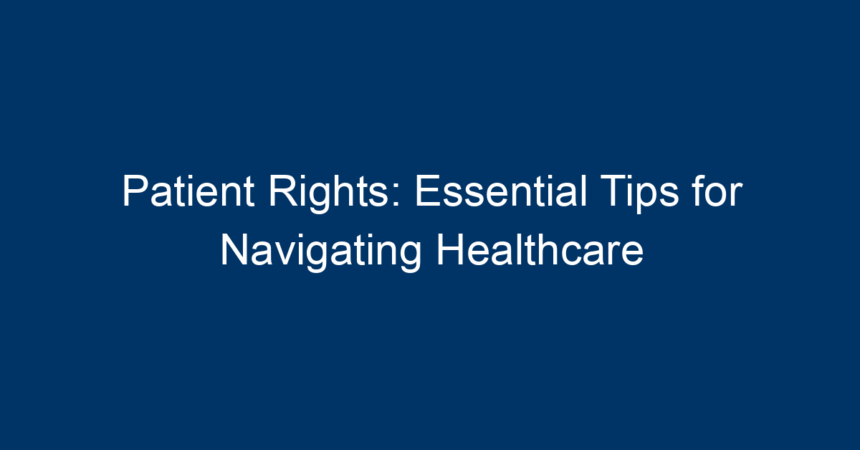Navigating the intricate world of healthcare can often feel like a daunting task. Understanding patient rights not only empowers you but also ensures that you receive the quality care you deserve. Patient rights are fundamental legal and ethical principles that protect individuals in their healthcare journey. This article will guide you through the essential patient rights every individual should be aware of, equipping you with the tools to navigate the healthcare system confidently.
Understanding Patient Rights
Patient rights encompass a range of ethical and legal considerations focused on safeguarding the dignity, privacy, and autonomy of patients. In the United States, these rights are often articulated through the Patient Bill of Rights, which ensures patients are treated with respect and integrity.
The Importance of Patient Rights
Understanding your patient rights is crucial for several reasons:
- Empowerment: When you know your rights, you can advocate for yourself during medical visits.
- Quality Care: Being aware of these rights enables you to seek and expect quality care from your healthcare providers.
- Reduced Anxiety: Clarity around patient rights can alleviate some of the stress associated with healthcare situations, knowing you have protections in place.
Key Patient Rights
1. Right to Informed Consent
Before any treatment or procedure, patients have the right to receive comprehensive information about their condition, the risks and benefits of proposed treatments, and alternative options. This right empowers you to make informed decisions about your healthcare.
- Action Tip: Always ask questions if you’re unclear about your treatment options or risks. Don’t be afraid to seek a second opinion if needed.
2. Right to Privacy and Confidentiality
Every patient has the right to privacy regarding their medical information. This includes how your information is shared and stored.
- Action Tip: Ensure you understand how your healthcare provider handles your medical data. Familiarize yourself with Health Insurance Portability and Accountability Act (HIPAA) guidelines to safeguard your privacy.
3. Right to Access Medical Records
Patients have the right to access their medical records. This empowers you to understand your health history, ongoing treatments, and to collaborate effectively with healthcare professionals.
- Action Tip: Regularly review your medical records and request corrections if you find any discrepancies. Keeping track can help you make informed health decisions.
4. Right to Receive Emergency Care
In emergencies, every patient has the right to receive immediate medical attention regardless of their ability to pay. This ensures that you receive the necessary care when you need it most.
- Action Tip: Know your local emergency services and understand the procedures for accessing emergency care in your area.
5. Right to Choose Providers
Patients can choose their healthcare providers or change them if necessary. This is particularly important for ensuring comfort and compatibility with your medical team.
- Action Tip: Take time to research potential healthcare providers. Look for reviews, qualifications, and specialties that match your needs.
6. Right to Participate in Treatment Decisions
Patients are entitled to be active participants in their healthcare decisions. This includes discussing treatment options and being involved in the planning of your care.
- Action Tip: Communicate openly with your healthcare provider about your preferences, concerns, and lifestyle. This collaborative approach can lead to more effective treatment plans.
7. Right to Be Heard and Respected
Every patient should be treated with dignity and respect. Your values, preferences, and cultural beliefs should be acknowledged in your care.
- Action Tip: Be open about your cultural background or specific needs that may affect your treatment. Do not hesitate to express concerns if you feel disrespected.
Navigating Healthcare with Confidence
Arming yourself with knowledge about your patient rights is only the first step. Here are a few more practical tips to help you navigate the healthcare system confidently.
Be Proactive
Taking initiative in your healthcare journey can significantly improve your outcomes. Don’t wait for things to happen. Research potential conditions, treatments, and follow-up care.
Develop Open Communication with Healthcare Providers
Building a rapport with your healthcare team fosters trust and encourages open dialogue. Don’t hesitate to voice concerns, ask questions, and seek clarity on treatment plans.
- Action Tip: Prepare a list of questions or concerns before appointments to maximize the time you spend with your provider.
Utilize Support Systems
Leverage family, friends, or patient advocacy groups to help navigate complex health systems and ensure you exercise your rights effectively. These support systems can provide valuable insights and emotional assistance.
Keep Detailed Records
Maintain your own health records at home. Document your symptoms, treatment plans, medications, and any communications with healthcare providers. This can be invaluable during medical appointments.
Know Your State’s Patient Rights Laws
Every state has its own set of laws regarding patient rights. Familiarize yourself with these regulations to better protect your interests.
Don’t Hesitate to File Complaints
If you believe your rights have been violated, don’t hesitate to file a complaint with the healthcare facility or governing body.
Conclusion: Taking Charge of Your Healthcare
Understanding and asserting your patient rights is crucial in today’s healthcare landscape. By educating yourself about these rights and remaining proactive in your healthcare journey, you can navigate the complex system with confidence.
Ultimately, knowing your patient rights not only empowers you but also fosters a collaborative and respectful relationship with your healthcare providers. Remember that you are a vital part of your healthcare team; your insights and preferences matter.
As you move forward, take these actionable insights with you:
- Be informed and ask questions.
- Keep thorough records of your health.
- Build a supportive network.
- Advocate for yourself and respect your rights.
By taking these steps, you’ll not only safeguard your own health but also inspire others to recognize the importance of patient rights in navigating healthcare.




